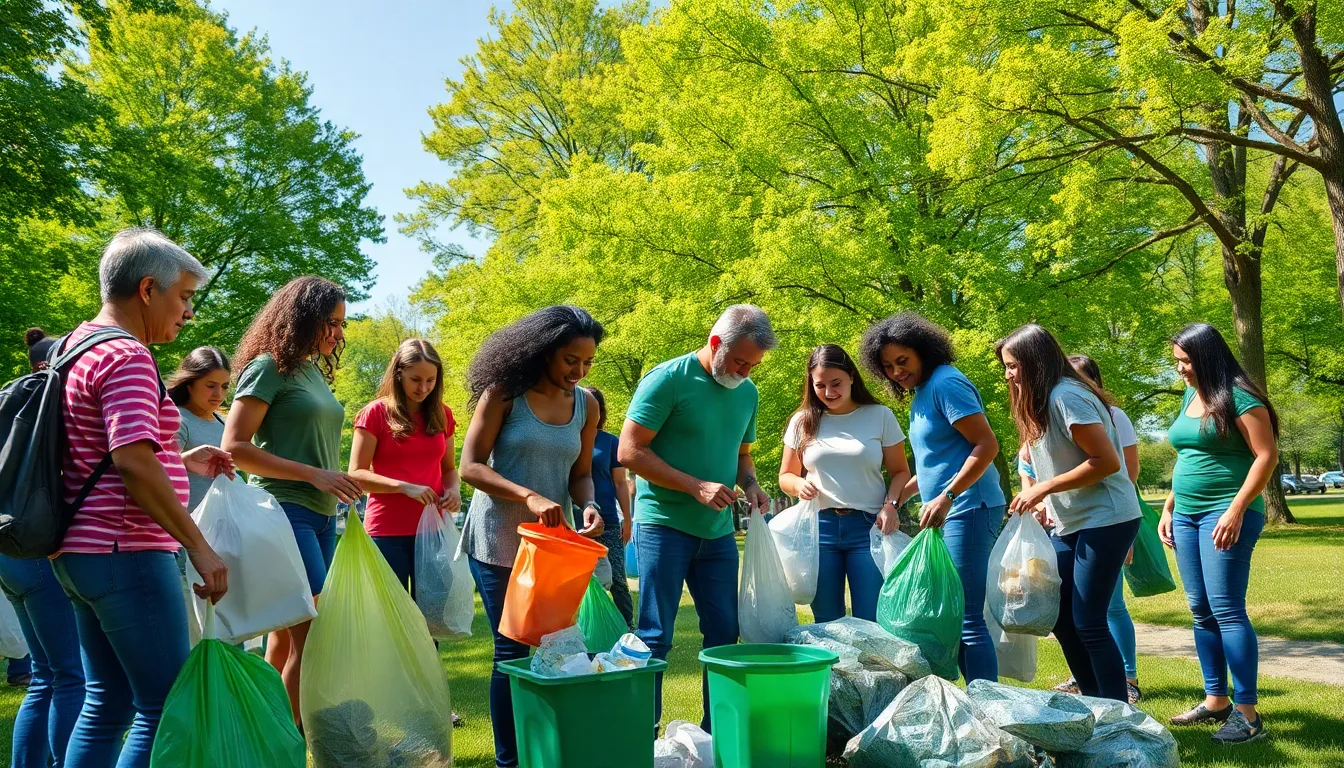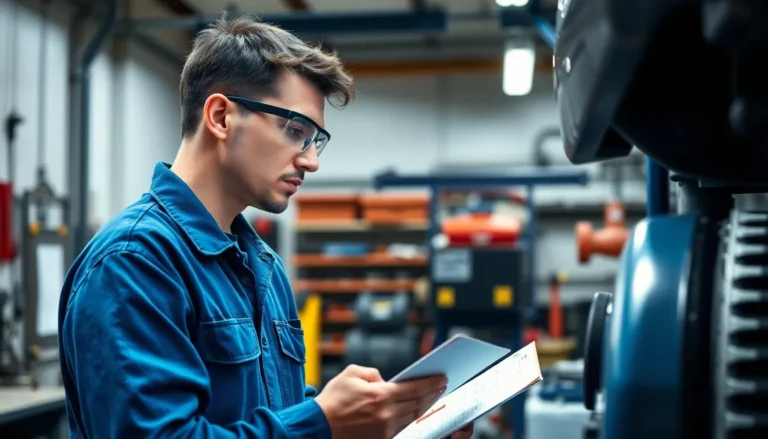Recycling projects are transforming communities and reshaping how people view waste. As environmental concerns grow, innovative initiatives emerge to turn discarded materials into valuable resources. These projects not only reduce landfill waste but also foster creativity and sustainability.
From upcycling furniture to creating art from plastic bottles, individuals and organizations are finding new ways to breathe life into the old. Engaging in recycling projects sparks awareness about the importance of reducing waste and encourages collaboration among community members. With each project, people learn that recycling is more than just a chore; it’s a pathway to a greener future.
Table of Contents
ToggleOverview of Recycling Projects
Recycling projects play a crucial role in transforming waste into useful resources. They promote sustainability and encourage community engagement through innovative practices.
Importance of Recycling
Recycling reduces the amount of waste sent to landfills and conserves natural resources. It minimizes environmental pollution, lowers greenhouse gas emissions, and saves energy. By supporting recycling projects, communities improve local economies, create jobs, and foster a culture of environmental consciousness. Education on recycling’s benefits enhances public participation and awareness, which is vital for achieving long-term sustainability goals.
Types of Recycling Projects
Recycling projects vary widely in scope and purpose. Common types include:
- Upcycling Initiatives: Upcycling transforms discarded materials into new products with higher value, such as furniture made from pallets or clothing made from textiles.
- Community Workshops: Workshops teach individuals how to recycle effectively, create art from waste, or build functional items from repurposed materials.
- Plastic Waste Collection: Projects that focus on collecting and recycling plastic waste from local beaches or parks help reduce environmental impact and raise community awareness.
- E-Waste Recycling: These projects specialize in collecting and recycling electronic waste, ensuring hazardous materials are disposed of safely and recovering valuable materials.
- School Recycling Programs: Educational institutions implement recycling programs to involve students in sustainability efforts, teaching them the significance of reducing waste.
- Art Installations: Artists create public installations using recycled materials to inspire conversations about environmental issues and encourage community participation in recycling efforts.
Innovative Recycling Projects

Innovative recycling projects transform waste into valuable resources while enhancing community engagement. These projects showcase creativity and collaboration, leading to more sustainable practices.
Community-Based Initiatives
Community-based initiatives focus on individual and collective efforts to minimize waste. Some examples include neighborhood clean-up events, which encourage residents to collect recyclables and reduce litter. Community gardens also utilize composting to manage organic waste, fostering local engagement and sustainable food practices. Art installations created from recycled materials serve as visual reminders of recycling’s importance and enhance community pride. By actively involving residents, these initiatives cultivate a strong sense of ownership and responsibility for the environment.
Technological Innovations
Technological innovations enhance recycling efficiency and effectiveness. Advanced sorting systems utilize AI to automate material recovery, improving accuracy in waste classification. Mobile applications allow users to locate recycling centers and monitor their recycling habits. Innovations in recycling processes, such as chemical recycling, break down plastics to their original monomers, enabling limitless recycling cycles. Additionally, 3D printing with recycled plastics creates new products from waste, showcasing the potential for closed-loop systems in manufacturing. These technologies foster environmental sustainability and contribute to a circular economy.
Challenges in Recycling Projects
Recycling projects face several challenges that can hinder their effectiveness and outreach. Addressing these challenges is crucial for enhancing community engagement and maximizing the impact of sustainability initiatives.
Financial Constraints
Financial constraints pose significant obstacles to the successful implementation of recycling projects. Many communities encounter budget limitations that restrict funding for initiatives. Projects requiring advanced technology, infrastructure development, or staff hiring typically need substantial investments. For example, automated sorting systems can range from $100,000 to $500,000, limiting access for smaller municipalities. Grants or partnerships with local businesses may alleviate some financial burdens, but such resources remain inconsistent. Moreover, ongoing operational costs can outpace available funding, leading to project discontinuation.
Public Awareness and Participation
Public awareness and participation in recycling efforts significantly affect project success. Many individuals lack knowledge about proper recycling practices or the importance of recycling. For instance, studies show that up to 50% of recyclable materials end up in landfills due to contamination. Educational campaigns that inform communities about recycling guidelines can improve participation and reduce contamination rates. Engaging the public through workshops, events, and social media can also enhance visibility and boost community involvement. Creative approaches, such as gamifying recycling initiatives or hosting challenges, can motivate residents to participate actively, creating a culture of sustainability.
Successful Case Studies
Numerous recycling projects around the globe demonstrate successful outcomes, transforming waste into valuable resources and fostering sustainable practices within communities.
Notable Projects Around the World
- The Zero Waste Movement in Kamikatsu, Japan focuses on extensive waste separation and recycling, achieving an impressive 80% waste diversion rate. Community participation is crucial to its success, with detailed guidelines on waste sorting.
- McDonough Braungart Design Chemistry (MBDC) promotes ecologically intelligent design through companies adopting cradle-to-cradle principles. This initiative has inspired numerous businesses to utilize sustainable materials and reduce waste.
- TerraCycle, founded in the United States, specializes in hard-to-recycle items, engaging individuals and organizations in waste collection and recycling efforts. Its partnerships with schools and businesses contribute to higher recycling rates and increased environmental awareness.
- Recycling in Freiburg, Germany, employs a comprehensive approach to waste management, with over 90% recycling rates. Citizens actively participate in programs that encourage waste reduction and resource recovery, making Freiburg a model for urban sustainability.
Lessons Learned from Successes
- Community Engagement is essential; active participation drives the success of recycling initiatives. Projects that involve community input often achieve higher participation rates.
- Education and Awareness foster better recycling practices. Successful programs often include educational campaigns that inform individuals about proper sorting techniques and recycling benefits.
- Collaboration with Local Businesses enhances project sustainability; partnerships between communities and businesses can provide necessary resources and additional funding.
- Innovative Incentives motivate participation. Reward systems, such as discounts or benefits for returning recyclables, encourage individuals to actively engage in recycling efforts.
- Feedback Mechanisms improve recycling programs. Collecting data and responses from participants allows organizers to adjust strategies for maximum effectiveness.
These case studies and lessons highlight effective strategies that can drive future recycling endeavors towards greater sustainability and community involvement.
Future Trends in Recycling Projects
Future trends in recycling projects focus on advancements that enhance efficiency and participation. These trends reflect a commitment to sustainability and innovative approaches to waste management.
Emerging Technologies
Emerging technologies revolutionize recycling processes and improve efficiency. AI-driven sorting systems enable precise material separation, increasing recycling rates by up to 25%. Blockchain technology enhances transparency in the recycling supply chain, ensuring accountability. Mobile applications aid users in locating nearby recycling centers, promoting user engagement. Additionally, chemical recycling techniques allow for the transformation of plastic waste back into raw materials, thus supporting the circular economy. Other innovations include 3D printing, which utilizes recycled plastics, creating new products while minimizing waste.
Policy and Regulatory Changes
Policy and regulatory changes influence the future of recycling projects significantly. Governments worldwide implement stricter regulations on waste management, encouraging recycling initiatives. Extended Producer Responsibility (EPR) laws hold manufacturers accountable for the end-of-life disposal of their products, promoting sustainable practices. Incentives for recycling programs, such as tax credits and grants, foster community investment in sustainability. Collaborative efforts among stakeholders, including local governments and businesses, strengthen recycling infrastructures and enhance community awareness. These changes aim to create a supportive environment for innovative recycling projects that foster long-term sustainability.
Recycling projects play a crucial role in shaping sustainable communities. By transforming waste into valuable resources they not only reduce landfill contributions but also inspire creativity and collaboration among residents. These initiatives highlight the importance of community engagement and education in fostering a culture of environmental responsibility.
As technology continues to evolve innovative solutions will enhance recycling efficiency and public participation. Challenges remain but with ongoing support and investment communities can overcome obstacles and maximize the benefits of recycling. Ultimately these projects pave the way for a greener future where sustainability becomes a shared value and practice.










